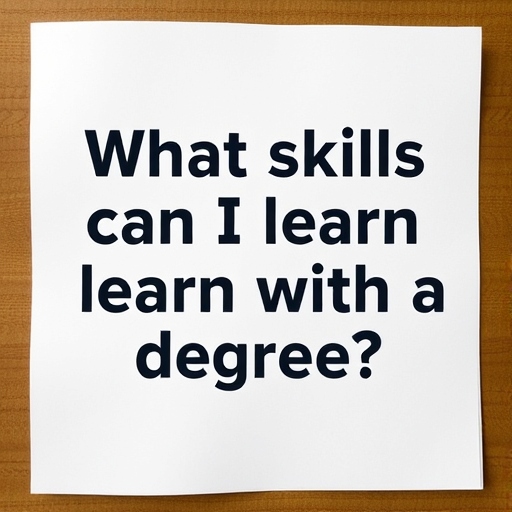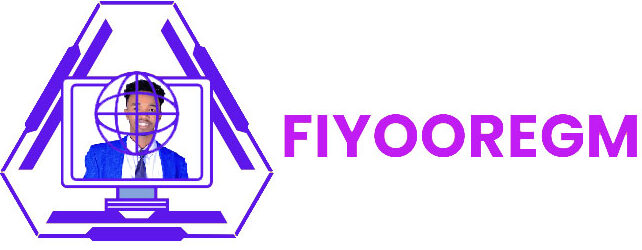
What Skills Can I Learn with a Degree? When it comes to higher education, one of the most frequently asked questions at the outset is: What exactly is it that this degree ends up teaching me? Whether one contacts this question from the angle of thinking about entering a profession-bound field, switching careers, or simply bettering personal skills, almost every degree can provide you with a multilevel bag of valuable skills that can be applied to different industries. In this article, we concern ourselves with discussing the types of skills that a degree can help to develop, how they make one more employable, and why they matter for personal and professional improvement.
1. Critical Thinking and Problem Solving Skills

Arguably, critical thinking is among the most useful faculties gained from getting a college degree. Every sort of degree-courses within humanities, the natural sciences, engineering, or business-though provide one with rigors intellectually in developing forms of complex problems, assessing and weighing arguments and solutions that are creative in nature within the field. Such cognitive capabilities raise the level in terms of solving problems to the above-mentioned categories and thereby lead to more value as an employee. An engineering student comes to understand how to approach problems analytically and helpfully break such problems down into simple parts. A student of business or economics will learn through practices like evaluating market trends, interpreting financial statements, and formulating strategies that pertain to solving business problems. The critical thinking does not concern one’s academic talents but also extending to one’s real-life decision-making, such as troubleshooting a technical issue or designing an effective marketing campaign.
2. Communication Skills

Communication is really the cornerstone of almost any career that is out there. The degree program helps you in both ways: to improve your written and oral communication skills, which is highly important for successful work in your future career. You will learn to express your ideas clearly and persuasively, whether in research papers, presentations, or team projects.
Communication is everything in terms of journalism, marketing, or public relations. Nevertheless, even the most technical, number-driven disciplines have a niche for engineers or computer scientists who can take the complicated and put it in words others can understand. Your degree will include learning how to use that acquired communication skill to reach various audiences with messages that catch the ear to get them to hear.
3. Teamwork and Collaboration
Achievement in individual terms may be important, but then it is more a reality that all careers are generally associated with the ability of an individual to manage well in tandem with other persons. Such group projects, collaborative research, and practicums would go a long way in enabling a degree program participant to learn how to be a part of a team. It teaches the skills of conflict resolution, delegation, and utilization of an individual’s strengths for a common goal that one intends to achieve.
It is one of the keys to success in the areas of business, health care, and education, among others. Even in such solitary professions as research, a person requires collaboration through colleagues, clients, or stakeholders. By the end of your degree, you will not only have gained the ability to function as a member of a team but also know how to lead and manage such teams making you even more versatile in your career.
4. Time Administration and Organizational Skills
A degree involves handling several assignments and examinations along the way. Hence, time-management becomes one of the primary and inevitable skills you would acquire. Learning how to prioritize work, deadlines, and the organization of coursework and their schedules will be useful even later in your professional life.
Whether in a busy venue, a project, or multitasking, time management is an essential skill for everyone. A degree course makes you work well despite much pressure, thereby teaching you how to manage time and resources effectively to maximize productivity.
5. Building Research and Analytical Capabilities

University degrees will always harbor a lot of research components especially for science-based, social sciences, and pure humanities subjects. Thus, competence in collecting, processing, and interpreting data from academic sources, experiments, and data analyses is developed. It is sought in the industry outside its core sectors, for example, in market research, policy analysis, data science, IT and so on.
For instance, in Psychology, the study an experimental method, behavior data an analysis and the data-driven conclusion presentation. If related to a wider aspect of the business world, one could look at different conclusions, such as analyzing markets toward understanding consumer trends whereby one could expect high or low performance of companies or products in future scenarios. For research skills actually enables an individual to stand more organized in professional terms on the basis of evidence.
6. Technical and Digital Proficiencies
Definitely, all these have made technical and digital literacy some of the most valuable qualifications today in almost every field of career. Certainly, technology and engineering courses, business, or even the more liberal arts courses would expose you to some tools and software applications or digital platforms that have now become critical parts of today’s workplaces.
From learning programming languages as a computer science student to understanding the tools for data analysis as part of an economics program or learning project management software during a business program, a degree roots ability into adaptable work-ready transformative capacity towards emerging technologies and trends. Such an asset is immeasurable in areas such as IT, finance, healthcare, or even education, where new rules are frequently rewritten by new technology.
7. Leadership and Management Skills
More often than not, the degree courses leave the designs open for either leadership and managerial opportunities. Most streams like business, law, and healthcare usually train a potential candidate on how best to combine decision-making capacity with that of a team in reaching results-oriented tasks.
It may not be automatically a leading opportunity; however, the individual may get such a position by demonstrating these attributes: either in the form of being a team leader or perhaps as a manager. Such attributes of leadership grow with age, and mostly with years of experience, which prepares individuals for greater responsibilities at operational levels too. Leading engineers in product development, overseeing an ad campaign, or even heading a corporate department are only some of those life skills that pay off over and over again.
8. Change is possibly the biggest lesson learned through a degree:
adaptability. Higher education prepares for the continuing education that it has now made highly important in dynamically changing work settings. Technologies move, business models shift, society’s illusions are continually shattered, and it is most important to learn concepts, to learn skills, and then learn how to adapt to changing environments for career longevity.
The adaptability and resilience imparted through a degree program will also assist in shifting into new forms of the workplace and the industry. Degree study grounds for further improvement into one’s professional life through further study, a number of certification programs, or job training.
9. Cultural Awareness and Global Perspective
The culture and perspective which an individual adapts at those times can differ from the others most of the time. Such studies as social sciences or humanities, or international relations regarding interpersonal degrees, ask a student to adopt various perspectives and learn other cultures. It opens out the entire world of a student and eventually turns into a very culturally aware individual with an interest in others.
In today’s world, which is certainly becoming more and more globalized, a global vision makes one of the biggest assets. Because no matter whether it’s for international business, diplomacy, or high-tech, cultural difference and knowledge of global dynamics will help understand markets, work with international people, and solve things with different perspectives.
10. Financia Literacy and Budgeting Capabilities

Though a degree on its own will not usually impart the necessary financial literacy and budgeting skills, it is most certainly a start to learning those things. While studying economics, business, or whatever else, one is likely to be informed of handling finances with prudence, reading financial reports, and making economic decisions. These skills, however, are necessary for professional success and also for personal wealth.
Understanding personal and corporate finance, budgeting, investment strategies, and financial planning would help you manage your money and then make informed decisions in business. Financial literacy is given increased recognition in the contemporary world as a critical skill-not only for accountants but for professionals in industries.
Conclusion:
Clearly, a degree provides much more than academic knowledge. It includes critical thinking, leadership, communication, and financial literacy; it helps lay a good foundation on which to base your journey through life and through today’s ferociously competitive job market. Further, what education may add in terms of personal development-overcoming-or discovering-is immeasurably more and adds significant value in someone’s ability to prosper professionally.
With all the skills learned in higher education, you would not only secure the job but learn how to acquire a career, how to face another new challenge, and a great deal of help to yourself and to the global economy much better. Thus, answering What skills can I learn with a degree?, here comes your crystal clear answer-all including everything that enables you to have a comfy life here in this fast-developing world.
The skills you acquire from your academic program will pave the way to enjoy success, good living, and learning beyond the classroom if you are just setting foot into the academic field or if you are going back to school.
